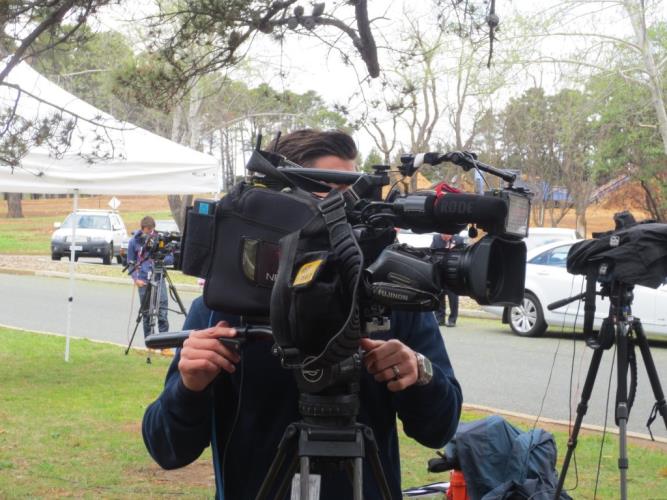Supervisor of Audio-Visual CUT Association. One of the directors of Macau Stories 1, also involved in Macau Stories 2─Love in the City and Macau Stories 3─City Maze. Macau Stories 2─Love in the City received a special mention at Portugal’s Avanca Film Festival, and was shown at film festivals in Tokyo and Osaka.

In January this year, a Hong Kong-based film crew was arrested by the police for unauthorised filming outside Public Security Forces Affairs Bureau in Macao. The director and the main cast were detained for the whole night, and the incident was only resolved when the director and the operator of the local film company issued a note of apology, explaining that it was an act of negligence on their part. The incident has aroused public attention towards the increase in filming activities in Macao, as well as served as a note of caution to those in the trade. It also raises concerns over these questions: what are the rights and responsibilities for a Macao-based film production company in accepting commissions from overseas film crews. How can it preserve its own interests? How should overseas film crews gain the necessary understanding towards the local regulations prior to their filming in Macao? When a local film production company accept overseas commissions, how do they defend their own interests? What should be done if and when overseas film crews violate the local laws?
For importantly, seeing that various government departments are likely to face more filming-related affairs in the future, there is a demand for support in the relevant administrative matters and a need for raising public awareness towards filming activities. On the other hand, even private venues in Macao will most likely experience a new surge of demand for film hire, and so the owners or operators of these private venues should also understand the relevant regulations and their own rights. Personally, I know of someone who has lent his own shop to a film crew to shoot a short video, only to realise, to his dismay, that the area outside his shop was completely littered with cigarette butts, while the interiors was turned upside-down and some smaller objects damaged by the crew. My friend learnt from this experience never to let out his shop premise to others for filming. Such irresponsible or unprofessional film crews, I believe, are the minority, and so it is a shame to witness how their behaviours have led to a vicious cycle of events, causing adverse impact on the overall filmmaking industry. Therefore, a clear set of rules setting out the rights and responsibilities, such as legal guidelines or a code of conduct for filming, is essential for both the filming party and [the operator]. These rules or guidelines can help raise the awareness towards such codes of conduct among government departments and filmmaking groups as well as the wider public.
To quote an example, under the purview of Communications and Creative Industries Branch of the Hong Kong Commerce and Economic Development Bureau, the Film Services Office of “CreateHK” has steadily undertaken to improve filmmaking affairs and community relations. Their work involves organising promotional activities to lobby for public support towards filmmaking. This office is further divided into different teams such as film development and support unit, promotions unit and special licensing unit. The team comprised a senior engineer as well as officers from different grades to offer professional advice on film crews on the use of machinery and explosives for special film effects. They also published filmmaking guidelines, listing out the various permits application processes, government stipulations, and the code of conduct for location filming, such as compliance with relevant traffic and noise regulations; preventing inconvenience to the public, littering or damage to the goods of others. The guidelines include advice to the public on how to report on film crews in breach of guidelines, as well as handling procedures for cases where the film crew experienced threats or accidents.
Another impressive feature of this guidebook is that it lists out the various public areas of government buildings, historic buildings and public hospitals, together with the application processes required. The Film Services Office also indicates clearly in the resource booklet the various filming permits, application forms for venue hire, samples of notification letters to location film crews, etc, so that the filming parties can be clear about the application logistics and access the relevant forms. The forms and guidelines covered many aspects of filmmaking, such as the imitation of uniforms and equipment of disciplinary forces, the use of machinery, guns and empty ammunition; the blockage to vehicular access; and the use of remote-controlled drone. At the same time, the resource outlined information on the processes applicable to local and foreign film production teams and the respective forms for them.
Previously, location filming in Macao would typically involve the vetting by some 11 departments such as the Cultural Affairs Bureau, Civil and Municipal Affairs Bureau, Public Security Police Force, Judiciary Police, Corpo de Bombeiros, Transport Bureau, Marine and Water Bureau, Civil Aviation Authority, Macao Government Tourism Office, Sports Bureau and the Customs. The draft of ‘One stop filmmaking application’ by the Cultural Affairs Bureau will certainly bring a positive impact on the overall development of films in Macao.